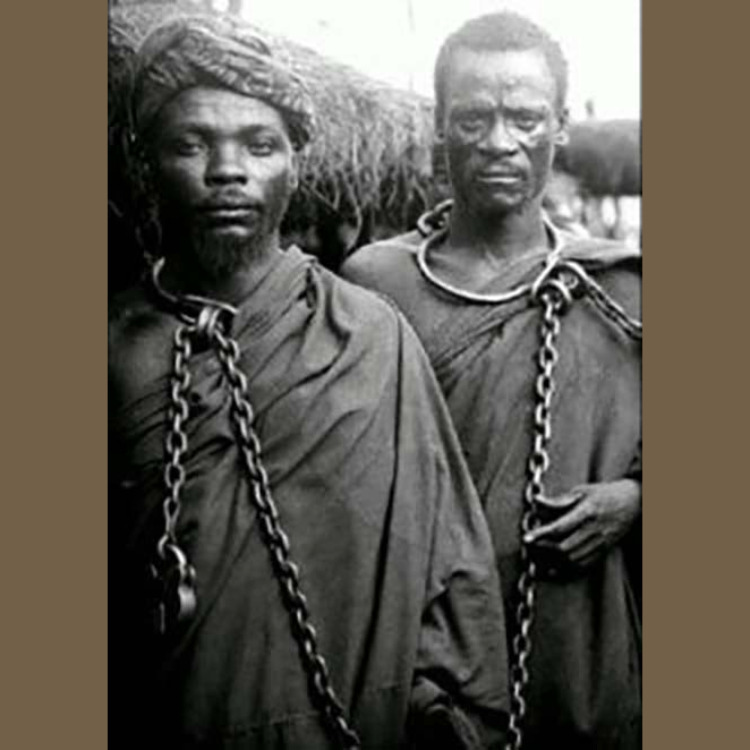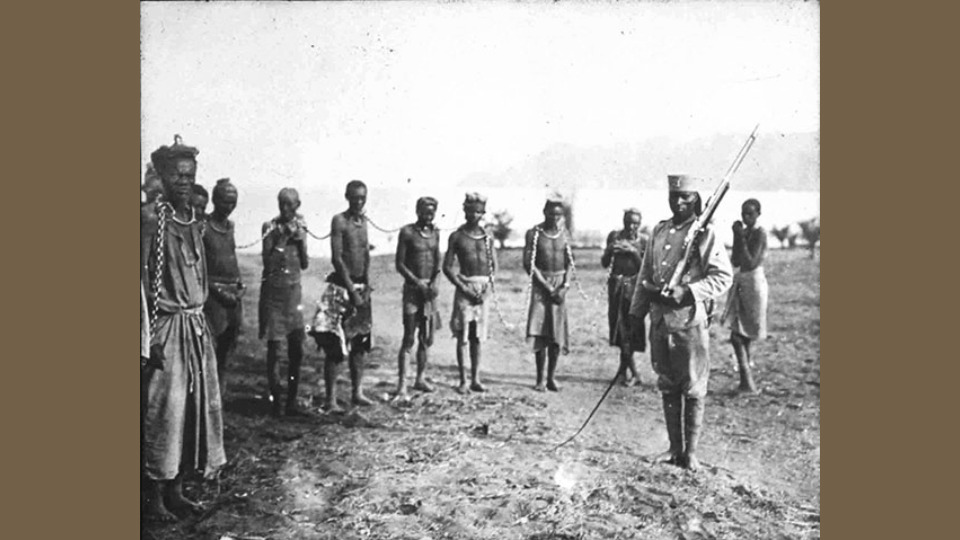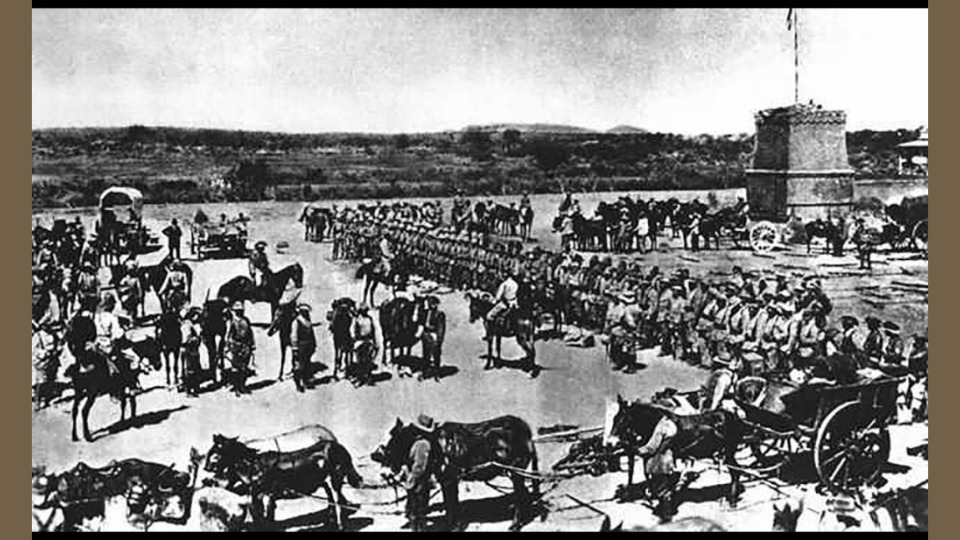Rebellions: The Maji Maji and The Herero Genocide
Colonial rule in Africa provoked a spectrum of resistance—from localized revolts against taxes and forced labor to large-scale rebellions and genocidal reprisals. These conflicts challenged European authority and forged early nationalist identities that would later drive independence movements.
The Maji Maji Rebellion (1905–1907)
In German East Africa (modern Tanzania), oppressive colonial policies—especially forced cotton cultivation, heavy head taxes, and arbitrary labor demands—bred deep resentment among diverse ethnic groups. Governor Gustav Adolf von Götzen’s 1902 decree mandating cotton quotas strained subsistence farming and disrupted social roles, as men were conscripted for plantation work and women shouldered new burdens at home. A severe drought in 1905 intensified food shortages and fueled widespread anger.
Kinjikitile Ngwale, a spirit medium of the Matumbi people, emerged as the rebellion’s catalyst. Claiming possession by a snake spirit called Hongo, he preached that sacred “maji” water mixed with millet seed would render warriors impervious to German bullets. This blend of animist and Islamic beliefs galvanized Matumbi, Ngoni, Yao, Zaramo, Bena, Pogoro, and other groups into a united front against colonial rule. The maji ideology created a shared identity that transcended traditional rivalries.
The revolt began in July 1905 when Matumbi fighters attacked the German outpost at Nandete. Within weeks, the rebellion spread south to Lindi, north toward Dar es Salaam, and west into the highlands. Rebels targeted cotton plantations, mission stations, administrative posts, and the railway. Though they achieved several early victories using surprise and spiritual fervor, their wooden and stone weapons could not match German machine guns and artillery.
Germany responded with brutal scorched‐earth tactics. Troops destroyed villages, fields, and water sources to starve rebel strongholds into submission. Famine, disease, and combat claimed an estimated 75,000 to 300,000 African lives. By August 1907, the uprising was effectively crushed, and Kinjikitile’s spirit‐inspired movement was dismantled. The human cost prompted the German administration to reform forced‐labor and cash‐crop policies and fostered a nascent sense of Tanzanian identity and resistance tradition.
The Herero and Namaqua Genocide (1904–1908)
In German South-West Africa (today’s Namibia), mounting tensions followed land seizures by settlers and forced labor laws that disrupted Herero and Nama livelihoods. By 1903, Herero cattle herders had lost vast grazing lands to colonial farms and the Otavi railway, and racist settler ideology viewed indigenous peoples as obstacles to development—setting the stage for violent confrontation.
On January 12, 1904, Herero under Paramount Chief Samuel Maharero attacked Okahandja, killing over 100 settlers and soldiers. Shortly after, Nama led by Hendrik Witbooi rose in rebellion. Lieutenant General Lothar von Trotha, appointed in June 1904, issued an “extermination order,” proclaiming that any Herero found within German territory would be shot. His Schutztruppe encircled rebels at the Waterberg Plateau and drove survivors into the Omaheke Desert, sealing off wells and inflicting mass death by thirst and starvation.
Survivors were forced into concentration camps—most notoriously at Shark Island and Nossob—where overcrowding, disease, abuse, and hard labor decimated prisoners. German medical officers conducted inhumane experiments on Herero and Nama inmates. By 1908, up to 80% of the Herero and 50% of the Nama populations had perished, marking one of the twentieth century’s first genocides.
International outrage eventually pressured Germany to rescind von Trotha’s policies, and some land was nominally returned. In 2021, Germany officially apologized and pledged €1.1 billion in development aid to affected communities, acknowledging the events as genocide.
Other Notable Early Revolts
– Abushiri Revolt (1888–1889)
Coastal uprising in modern-day Tanzania led by Arab trader Abushiri ibn Salim al-Harthi against the German East Africa Company’s monopoly and land concessions. German gunboats and reinforcements quelled the revolt by mid-1889, and Abushiri was captured and executed, yet the conflict exposed corporate rule’s fragility and inspired future resistance.
– Hut Tax War (1898)
Revolt in Sierra Leone by Mende and Temne farmers under Chief Bai Bureh against a British-imposed hut tax designed to coerce wage laborers. Guerrilla tactics from February to August 1898 forced Britain to deploy the Sierra Leone Frontier Police and West India Regiment. Though suppressed, the uprising prompted reforms in tax policy and military organization.
– Bambatha Rebellion (1906)
Zulu clans in Natal, South Africa, rebelled under Chief Bambatha kaMancinza against a new poll tax. On February 22, 1906, ambushes at Mpanza’s kraal ignited a month of hit-and-run attacks across Zululand. British troops, armored trains, and Native Contingent units eventually crushed the rebellion; hundreds were killed and thousands detained, cementing Zulu defiance and fueling later nationalist consciousness.
References
- Maji Maji Rebellion – Wikipedia. https://en.wikipedia.org/wiki/Maji_Maji_Rebellion
- Maji Maji Revolt, Africa – Encyclopedia.com. https://www.encyclopedia.com/history/encyclopedias-almanacs-transcripts-and-maps/maji-maji-revolt-africa
- The Maji Maji Rebellion: United Resistance Against German Rule Explained – History Rise. https://historyrise.com/the-maji-maji-rebellion-united-resistance-against-german-rule/
- Maji‐Maji War, 1905–1907 – Oxford Research Encyclopedia of African History. https://oxfordre.com/africanhistory/display/10.1093/acrefore/9780190277734.001.0001/acrefore-9780190277734-e-154
- History of Maji Maji Rebellion: What were the major causes & effects? – World History Edu. https://worldhistoryedu.com/history-of-maji-maji-rebellion-what-were-the-major-causes-effects/
- Herero and Namaqua genocide – Wikipedia. https://en.wikipedia.org/wiki/Herero_and_Namaqua_genocide
- German-Herero conflict of 1904–1907 – Britannica. https://www.britannica.com/topic/German-Herero-conflict-of-1904-1907
- The Herero and Namaqua Genocide – The Holocaust Explained. https://www.theholocaustexplained.org/what-was-genocide/the-herero-and-namaqua-genocide/
- The Herero And Nama Genocide: Germany’s Brutal Colonial Legacy Explained – History Rise. https://historyrise.com/the-herero-and-nama-genocide-germanys-brutal-colonial-legacy/
- Abushiri Revolt – Wikipedia. https://en.wikipedia.org/wiki/Abushiri_Revolt
- Hut Tax War – Wikipedia. https://en.wikipedia.org/wiki/Hut_Tax_War
- Bambatha Rebellion – Wikipedia. https://en.wikipedia.org/wiki/Bambatha_Rebellion
latest video

nia via inbox
Stay connected. Subscribe and get updated on what's new with Nia!








